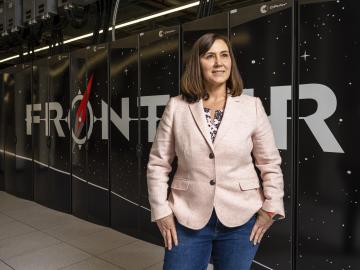
Filter News
Area of Research
- (-) National Security (10)
- (-) Neutron Science (11)
- (-) Nuclear Science and Technology (17)
- (-) Supercomputing (67)
- Biology and Environment (32)
- Biology and Soft Matter (1)
- Computational Biology (1)
- Computer Science (2)
- Energy Science (39)
- Fusion and Fission (20)
- Fusion Energy (4)
- Isotopes (2)
- Materials (31)
- Materials for Computing (7)
- Quantum information Science (4)
News Topics
- (-) Chemical Sciences (2)
- (-) Computer Science (52)
- (-) Energy Storage (3)
- (-) Frontier (17)
- (-) Nuclear Energy (20)
- (-) Polymers (1)
- (-) Quantum Science (12)
- 3-D Printing/Advanced Manufacturing (7)
- Advanced Reactors (4)
- Artificial Intelligence (27)
- Big Data (18)
- Bioenergy (7)
- Biology (10)
- Biomedical (13)
- Biotechnology (2)
- Buildings (2)
- Clean Water (2)
- Coronavirus (10)
- Cybersecurity (8)
- Environment (20)
- Exascale Computing (16)
- Fossil Energy (1)
- Fusion (6)
- Grid (4)
- High-Performance Computing (27)
- Hydropower (1)
- Isotopes (3)
- Machine Learning (16)
- Materials (10)
- Materials Science (15)
- Mathematics (2)
- Microscopy (2)
- Molten Salt (1)
- Nanotechnology (6)
- National Security (24)
- Neutron Science (56)
- Partnerships (1)
- Physics (6)
- Quantum Computing (11)
- Security (7)
- Simulation (12)
- Software (1)
- Space Exploration (3)
- Summit (22)
- Transportation (4)
Media Contacts

At the National Center for Computational Sciences, Ashley Barker enjoys one of the least complicated–sounding job titles at ORNL: section head of operations. But within that seemingly ordinary designation lurks a multitude of demanding roles as she oversees the complete user experience for NCCS computer systems.

A trio of new and improved cosmological simulation codes was unveiled in a series of presentations at the annual April Meeting of the American Physical Society in Minneapolis.

Stephen Dahunsi’s desire to see more countries safely deploy nuclear energy is personal. Growing up in Nigeria, he routinely witnessed prolonged electricity blackouts as a result of unreliable energy supplies. It’s a problem he hopes future generations won’t have to experience.

Environmental scientists at ORNL have recently expanded collaborations with minority-serving institutions and historically Black colleges and universities across the nation to broaden the experiences and skills of student scientists while bringing fresh insights to the national lab’s missions.

ORNL’s next major computing achievement could open a new universe of scientific possibilities accelerated by the primal forces at the heart of matter and energy.

ORNL researchers are deploying their broad expertise in climate data and modeling to create science-based mitigation strategies for cities stressed by climate change as part of two U.S. Department of Energy Urban Integrated Field Laboratory projects.

Five National Quantum Information Science Research Centers are leveraging the behavior of nature at the smallest scales to develop technologies for science’s most complex problems.

Travis Humble has been named director of the Quantum Science Center headquartered at ORNL. The QSC is a multi-institutional partnership that spans industry, academia and government institutions and is tasked with uncovering the full potential of quantum materials, sensors and algorithms.

Cameras see the world differently than humans. Resolution, equipment, lighting, distance and atmospheric conditions can impact how a person interprets objects on a photo.

When the COVID-19 pandemic stunned the world in 2020, researchers at ORNL wondered how they could extend their support and help


